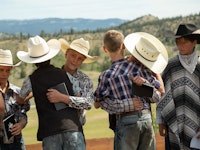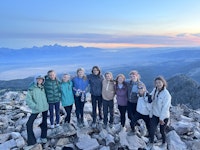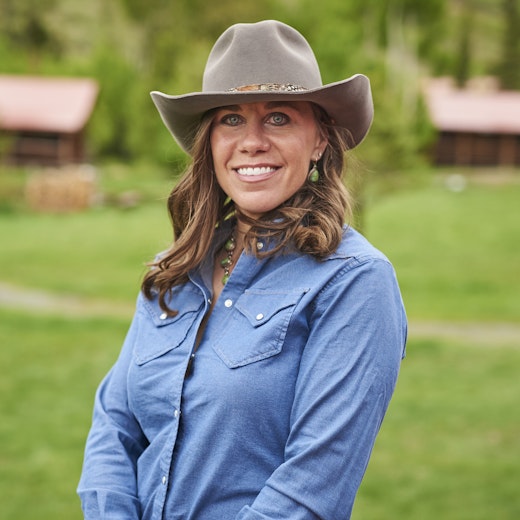
Camp is Over. What is this feeling?
Your camper has attended Teton Valley Ranch Camp for their first sleepaway camp experience. It is the first time you have been away from your 12 year old for this long, and you cannot wait to see them at the Final Rodeo. You received letters from your camper the first week they were away, and it was hard to hear how much they missed you and how they had struggles in their cabin and on that first hard hike. Then the letters become fewer and farther between, which makes you miss them even more.
Finally, the day has come, and you drive down that long driveway with the unbearable anticipation of hugging your child. Tears begin as a familiar bright smiling face comes running to your outstretched arms. They are not alone, however, as six other campers run alongside, and your camper hurriedly introduces each of them. The interaction is brief, as the campers are all eager to get prepared for the Rodeo starting in moments.
The day flies by as you watch your camper participate in a Rodeo event, eat delicious Rodeo food, and meet other camper parents and TVRC staff members. At the end of the day, everyone puts their arms around each other and they sing Serenade and Peace in unison. The tears start flowing, and you struggle to get your camper to come willingly to the car. The six campers who surrounded them at the beginning of the day now envelope each other in a huge hug. Lots of promises are made about staying in touch and returning next summer.
That car ride following is one of the most difficult rides you have experienced with your child. You, the parents, have been so excited to have your camper home, but now all your camper can do is cry as they look out the window at the passing scenery. Is this the same kid who cried the nights before leaving because they were worried about being homesick? Didn’t this kid write home the entire first week begging us to pick them up because they missed home? What is this?
Campsickness is a true emotion. To understand campsickness, we need to understand what our campers are missing so much when camp is over and they return home. Homesickness is the result of missing the comforts of home: loving parents, comfortable beds, family pets, security. However, at camp, they are able to experience things that are not readily available at home: close friends that are always around, counselors dedicated to providing undivided attention, celebrations of hard won accomplishments, skits and songs providing pure screen- free entertainment, three meals a day sitting family style around a table, and a time each night to grow closer to their cabin mates in a circle. They miss the freedom of choosing their activities for themselves each day and the independence that provides. They miss the type 2 fun they experience after a very difficult hike up a mountain for the first time, reflecting on how amazing it felt to summit with their friends together to the top. They miss the confidence they see in the eyes of their trip leaders and counselors that they can do hard things. Most of all, they miss their friends. Yes, they have friends at home, but with the distractions of activities, school and cell phones, it doesn’t feel the same. Yes, it is possible to feel closer to someone you have only known for a month because of the shared adventures, challenging experiences and hours of technology free time spent together. Driving away from the sacred TVRC environment that fosters the play-based childhood this young generation lacks, and the jolt back into the screen based childhood our society has embraced is a retroactive culture shock that can take time to re-settle. You, the parent, ask yourself the question, was this worth it?! Yes! This feeling, though emotionally challenging, is absolutely worth it. As Alfred, Lord Tennyson wrote:
I hold it true, whate’er befall; I feel it, when I sorrow most; ’Tis better to have loved and lost Than never to have loved at all.
Now that you are home, what do you do?
While it is impossible to turn your home into a true TVRC replica, there are pieces of camp you can bring into your home that will make it a better place for the entire family. Here are some ideas to bring home:
- Stay in touch with camp friends: Texts and emails work, but it lacks the personal aspects of being face to face. I love nothing more than a handwritten note received through the mail. However, a video call or facetime is a great alternative way to stay in touch with camp friends. We are constantly reminded each summer that it is the people who make TVRC so special.
- Family Dinner: We get it… schedules are busy and we are all going different directions. But dedicating to having at least one meal a day where the entire family sits around the table, discussing current personal events, is a way to grow closer and enjoy that feeling we have at camp three times a day. Extra points if the dinner table is cell phone free.
- Family Adventure: Plan that next family adventure you have been wanting to do, but haven’t found the time. Find a local hike or a beauty spot to get out in nature together.
- Time with Friends: Try to plan an extended weekend for your camper to spend with a friend. Not just a few hours or a night, but a multi-night/day time when they can spend quality time together. Extra points if it can include nature and exclude cell phones.
- Allow more independence: This can be difficult because we have become a very safety driven society. However, your camper has done some amazing things this summer, and they have the ability to problem solve and take some low level risks. Show them you are confident in their ability to make good decisions and have some independence at home. Are you walking distance from a grocery store? Send them to the store to grab a few things you need for dinner. Allow them to go on a long bike ride with a friend. Giving them some freedom to play without constant supervision will allow them to grow and recreate some independence they enjoy at camp.
- Increase Responsibility in the home: At TVRC, your camper has been responsible to make their bunk, sweep their cabin floor, organize and clean bathrooms daily for inspection. They “hop” the table after each meal and take their dishes to scullery to be cleaned. Many of them even volunteer regularly to wash dishes! Kids love to feel like a valued member of a household and it will continue developing the work ethic they are encouraged to have at the Ranch. A study conducted by Harvard Research has found that shared responsibilities help children develop greater self-worth, confidence, work ethic, and empathy for others and is connected with later professional success and happiness.
- Limit Cell phones: It may seem like your child cannot live without it, but they did just fine without that pocket sized, attention grabbing device for 4 entire weeks. Have designated times when the phone is put away to limit distractions. Parents… This is for us as well. It works best when we are not distracted by our device while we are limiting their cell phone time.
- Have a family circle: Each night at camp, cabin groups sit in a circle and answer a question that brings the group closer together. Sometimes it can be a silly question and sometimes a little deeper. It encourages meaningful connection to have a moment of respect when each member of the family has a moment to speak. While nightly may not work with your schedule, dedicating one post-dinner night a week to this would be powerful. I would recommend Talking Point Cards for the Family to help lead the questions. Once we started this practice, our kids wanted to do it after each dinner.
- Have them tell their story: It is difficult to get anything out of our kids when we are prompting. “How was camp?” you ask. “It was good…” is their reply. But when memories are evoked and they start to talk about that sunrise summit, the breakfast ride flapjacks, that packtrip ride in the rain, stop and listen.
- Sign up for next summer: This may seem obvious, but knowing they will be returning to the Ranch, a place they have grown to love, will allow your camper to start cherishing the memories of the past summer and looking forward to the summer ahead. One of our camper families makes Christmas style paper chains to signify the weeks leading up to the summer. Each week, they remove a chink in the paper chain and watch as the chain gets shorter and shorter. It helps grow the anticipation for the next summer!
Camp allows our kids so much autonomy, it is only natural for them to grieve this time as they go back into the real world. The world of summer camp is the final frontier for our kids to stay kids just a little bit longer. In this world, they have face to face communication with other kids their age. They are able to take risks and make mistakes without the pressures of everyday life. They go back in time a few decades to enjoy what it was like to grow up without the presence of social media; of staying outside with their friends until the street lights come on. This grief is a good thing. As A.A. Milne says, “How lucky am I to have something that makes saying goodbye so hard”. Your camper has something that makes saying goodbye really difficult, isn’t that beautiful? What a gift you have provided for them.


